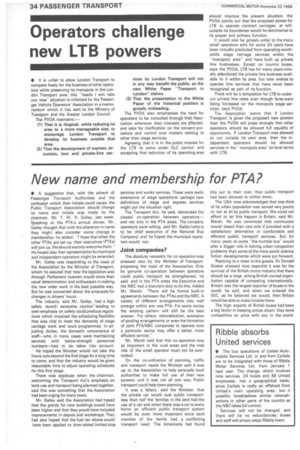New name and membership for PTA?
Page 36

If you've noticed an error in this article please click here to report it so we can fix it.
• A suggestion that, with the advent of Passenger Transport Authorities and the confusion which their initials could cause, the Public Transport Association should change its name and initials was made by the chairman, Mr. T. W. H. Gailey, last week. Speaking at the PTA's annual dinner, Mr. Galley thought that with the alteration in name they might also consider some change in membership; he added: "I hope that when the other PTAs are set up, their executives (PTEs) will join us. We should warmly welcome them.' He hoped also that representation by municipal and independent operators might be extended.
Mr. Gailey was responding to the toast of the Association by the Minister of Transport, whom he assured that now the legislation was through Parliament busmen would show their usual determination and enthusiasm in making the new order work in the best possible way. But he was concerned about the proposals for changes in drivers' hours.
The industry, said Mr. Gailey, had a high safety record: excessive caution' leading to over-emphasis on safety could produce regulations which impaired the scheduling flexibility that was vital to meet the demands of stage carriage work and tours programmes. In adjusting duties, the domestic convenience of staff—who in many cases were maintaining services with below-strength personnel numbers--had to be taken into account.
He hoped the Minister would not take the hours cuts beyond the first stage fora long time to come, and that the industry would be given reasonable time to adjust operating schedules for this first stage.
There was applause when the chairman, welcoming the Transport Act's emphasis on land-use and transport being planned together, said this was something that the Association had been urging for many years, Mr. Galley said the Association had hoped that the grants for new buildings would have been higher and that they would have included improvements in depots and workshops. They had also hoped that the fuel tax rebate would have been applied to time-tabled limited stop services and works services. These were really extensions of stage operations; perhaps new • definitions of stage and express services might put the situation right.
The Transport Act, he said, demanded the closest co-operation between operators— and not only in the PTA areas. The company operators were willing, said Mr. Gailey (who is to be chief executive of the National Bus Company) and he hoped the municipal operators would, too.
Joint companies?
The absolute necessity for co-operation was stressed also by the Minister of Transport, proposing the toast of the Association. Only by genuine co-operation between operators could public transport be strengthened, he said, and in the PTA areas the Executive and the NBC had a statutory duty to do this. Added Mr. .Marsh: -There will be formal built-in agreements between the PTAs and the NBC. A variety of different arrangements may well emerge within any one PTA. For some routes the existing pattern will still be the best answer. For others, rationalization, extension of pooling arrangements or even the formation of joint PTA/NBC companies to operate over a particular sector may offer a better, more efficient service."
Mr. Marsh said that this co-operation was as important in the rural areas and the vital role of the small operator must not be overlooked.
On the co-ordination of planning, traffic and transport needs the Minister said it was up to the Association to help persuade local authorities to make full use of their new powers: and it was not all one way. Public transport could help town planning.
It was a fallacy, said the Minister, that the private car would oust public transport: less than half the families in the land had the use of a car and when there was a cart° every home an efficient public transport system would be even more important since each member of the family had a conflicting transport need. The Americans had found this out to their cost; their public transport had been allowed to wither away.
The USA now acknowledged that one third of its urban population was served very poorly or not at all by public transport. We could not afford to let this happen in Britain, said Mr. Marsh. He was convinced that commuters would desert their cars only if provided with a satisfactory alternative_ in comfortable and efficient public transport services. But for many years to come -the humble bus" would play a bigger role in solving urban congestion problems than some of the more exotic science fiction developments which were put forward.
Replying to a toast to the guests, Sir Donald Stokes stressed how essential it was for the survival of the British motor industry that there should be a large, strong British-owned organization capable of competing internationally. Britain was the largest exporter of buses in the world, he said, and when we entered the EEC. as he believed we would, then Britain would be able to make inroads there The high exports of British buses had been a big factor in keeping prices down: they were competitive on price with any in the world.




















































































































